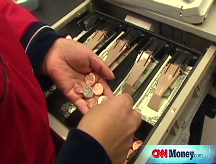Geithner's fate: Fear vs. outrage
Congress is upset about how the bailout funds were spent and now Geithner's taxes. But the severity of the crisis may get him confirmed.
WASHINGTON, D.C. (Fortune) -- Fear vs. outrage.
Those are the two primal emotions at war in the hearts and minds of lawmakers as they wrestle with the intertwined decisions over whether to confirm Timothy Geithner as Treasury secretary and whether to offer another $350 billion crutch to the nation's banking system.
Fear is a politician's most powerful motivator. It was the emotion behind Congress' vote to authorize the invasion of Iraq to destroy (we now know) nonexistent weapons of mass destruction. It was the emotion behind Congress' quick and dirty handover of an unprecedented $700 billion to the Treasury secretary to rescue (or bail out, depending on your view) Wall Street -- and thereby the fate of nation's financial system, Congress was told.
If Geithner, as expected, survives the uproar over neglect of his personal tax bill, and receives the Senate's nod, fear will be one factor on his side. With financial markets still fragile, lawmakers want incoming President Obama to have his Treasury secretary in place as soon as possible -- with a ready store of cash on hand to control any frightening surprises that comes his way.
As a Geithner ally and Washington veteran said of the nominee's confirmation woes: "If we weren't in this period, he'd be dead."
But the Senate, where Geithner's fate will be decided after a confirmation hearing now pushed back to next Wednesday, is a notoriously status-quo chamber.
Senators like the familiar, and Geithner is a known quantity in Washington: as a Clinton Treasury official; on Wall Street, as New York's Federal Reserve chief and co-architect of the 2008 financial market interventions; and now in the Senate, where he has spent most of the past month meeting with senators and crafting changes to the TARP financial-rescue package to ease growing unrest over how the Treasury Department is spending hundreds of billions in taxpayer money.
Which brings us back to that competing emotion -- outrage -- which in politics ranks a close second to fear.
Already, the outrage over how Treasury spent the first $350 billion in TARP money is palpable. Both Democratic and Republican lawmakers are using the upcoming vote over the Obama-Bush request for the second installment as a chance to vent their own anger.
Last week, the congressional panel overseeing those funds released a searing report, asking why banks aren't using more of those taxpayer dollars to bolster lending and criticizing Treasury for diverting emergency funds to Detroit's automakers.
"The bailout isn't working," says Sen. Jim Bunning of Kentucky, a Republican on the Senate Finance Committee who hasn't made up his mind on how to vote on Geithner. "And what is worse is that we were sold one thing and they did another."
But there's also an outrage factor in Geithner's tax troubles that will affect that vote. While senators have kept their comments measured and mostly supportive of the nominee, commentators and bloggers are stirring indignant waters.
As an International Monetary Fund official from 2001 to 2004, Geithner failed to pay his payroll taxes, which transition officials say is a common mistake for U.S. employees of international organizations who are technically considered "self-employed."
The IMF, like the World Bank, reimburses employees for these taxes with the expectation that they will file themselves. Geithner paid part of the back taxes he owed after a 2006 audit, but didn't pay the balance of $25,970 until after his nomination as Treasury Secretary last November. Senate Finance Committee members, Republican and Democrat, have publicly waved all this off as an honest "mistake." (Senior committee members were informed of the tax issue in December.)
But, with his confirmation hearing now postponed, there is a full week for the political megaphone to issue a louder message.
"What was Obama thinking?" asked Politico, noting that the president-elect was fully aware of the tax issue when he nominated Geithner and that similar personal issues have sunk past cabinet candidates. Another news account quoted an accountant who opined that missing the payment of Social Security and Medicare taxes is a lame and easily avoidable mistake.
Geithner's personal tax problem also gives new ammunition to critics of the Wall Street bailouts he helped design.
"Absolutely astonishing," says John Berlau, a sharp critic of both Geithner and TARP at the conservative Competitive Enterprise Institute. "To have him leading the department that manages the IRS would be a slap in the face to the millions of self-employed Americans who fulfill their responsibilities to correctly assess their tax burdens."
Berlau hopes Obama will abandon his nominee. "If Geithner is a liability, it may be easier to get the TARP money without him," he says.
At this point, that's unlikely. But the emotions of Capitol Hill can be unpredictable - just like Geithner's fate. ![]()
-
 The retail giant tops the Fortune 500 for the second year in a row. Who else made the list? More
The retail giant tops the Fortune 500 for the second year in a row. Who else made the list? More -
 This group of companies is all about social networking to connect with their customers. More
This group of companies is all about social networking to connect with their customers. More -
 The fight over the cholesterol medication is keeping a generic version from hitting the market. More
The fight over the cholesterol medication is keeping a generic version from hitting the market. More -
 Bin Laden may be dead, but the terrorist group he led doesn't need his money. More
Bin Laden may be dead, but the terrorist group he led doesn't need his money. More -
 U.S. real estate might be a mess, but in other parts of the world, home prices are jumping. More
U.S. real estate might be a mess, but in other parts of the world, home prices are jumping. More -
 Libya's output is a fraction of global production, but it's crucial to the nation's economy. More
Libya's output is a fraction of global production, but it's crucial to the nation's economy. More -
 Once rates start to rise, things could get ugly fast for our neighbors to the north. More
Once rates start to rise, things could get ugly fast for our neighbors to the north. More










